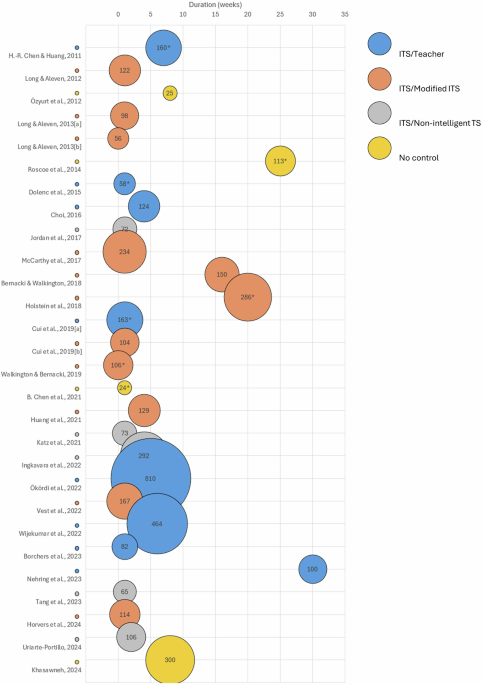Imagine a classroom where each student's learning experience is tailored to their individual needs, much like a personal tutor guiding them through the complexities of their educational journey. This vision is becoming a reality with the increasing implementation of Intelligent Tutoring Systems (ITSs) in K-12 education.
The Promise of Intelligent Tutoring Systems
Intelligent Tutoring Systems are designed to provide personalized instruction and feedback, adapting to the unique learning pace and style of each student. According to a recent systematic review highlighted by Nature.com, these systems generally have a positive impact on student learning and performance. However, the effects are somewhat mitigated when compared to more traditional, non-intelligent systems.
"The real educational value of ITSs remains uncertain, and further research is needed to fully understand their potential," the review emphasizes.
The Need for Further Research
While the initial findings are promising, the review calls for more extensive research to truly gauge the effectiveness of ITSs. It suggests that longer interventions and larger sample sizes are necessary to draw more definitive conclusions. Additionally, the ethical implications of using such technology in education must be carefully considered to ensure that these systems are used responsibly and equitably.
As we stand on the brink of a new era in education, it's essential to approach these innovations with both excitement and caution. The potential for ITSs to revolutionize learning is immense, but it must be balanced with a commitment to understanding their impact fully.
Looking Ahead
The journey towards integrating Intelligent Tutoring Systems into mainstream education is just beginning. As educators, researchers, and technologists collaborate to refine these systems, the hope is to create a learning environment where every student can thrive. With continued research and ethical considerations at the forefront, the future of education looks bright and promising.
Originally published at https://www.nature.com/articles/s41539-025-00320-7
ResearchWize Editorial Insight
The article "Intelligent Tutoring Systems: A New Era in K-12 Education" is a beacon of hope and caution for educators and researchers alike. It paints a picture of a classroom where technology meets individual student needs, promising a personalized learning journey akin to having a dedicated tutor for each child. This vision is particularly relevant for teachers who strive to meet diverse learning needs in their classrooms, often with limited resources.
For teachers, the idea of Intelligent Tutoring Systems (ITSs) can be both exciting and daunting. On one hand, these systems offer the potential to tailor instruction to each student's pace and style, which is the holy grail of differentiated instruction. Imagine being able to provide immediate feedback and adapt lessons in real-time—this could transform classroom dynamics and student engagement. However, the article wisely urges caution, noting that the true educational value of ITSs is still uncertain and requires more research. This is a reminder that while technology can be a powerful tool, it should not replace the human touch that teachers bring to the classroom.
From an inclusion perspective, ITSs hold promise for leveling the playing field. They could provide support for students who might otherwise fall through the cracks, offering additional practice and reinforcement where needed. Yet, the ethical considerations mentioned in the article are crucial. We must ensure that these systems are implemented equitably, without bias, and that they do not widen existing gaps among students with varying access to technology.
For researchers, the article highlights a fertile ground for exploration. The call for longer interventions and larger sample sizes underscores the need for robust studies that can provide clearer insights into the effectiveness of ITSs. Researchers have the opportunity to delve into not only the academic outcomes but also the socio-emotional impacts of these systems on students.
In sum, the article serves as both an invitation and a cautionary tale. It invites educators and researchers to explore the potential of ITSs while reminding us to tread carefully, ensuring that our pursuit of innovation does not overshadow the fundamental goal of education: to nurture and support every learner. As we stand on the cusp of this new era, let us proceed with both curiosity and care, always keeping the well-being of our students at the heart of our endeavors.
Inclusion will play a pivotal role in this journey. Just as a garden thrives with a diversity of plants, our classrooms will benefit from embracing the varied backgrounds and learning styles of students. AI can assist by providing tools that accommodate different needs, ensuring that every student feels valued and supported. This approach fosters a sense of belonging, encouraging students to share their unique perspectives and learn from one another.
The emotional side of education is as crucial as the academic. Intelligent Tutoring Systems can be designed to recognize when a student is struggling emotionally, offering gentle nudges or alerts to teachers who can provide the necessary support. This sensitivity to emotional well-being is akin to tending to the delicate flowers in our garden, ensuring they are not overshadowed by more robust plants.
As we look to the future, the goal is not to replace human interaction but to enhance it. By integrating AI thoughtfully, we can create an educational environment where technology and humanity coexist harmoniously, each enhancing the other's strengths. This vision of education is not just about imparting knowledge but about cultivating a community where every student can grow and thrive.
Originally reported by https://www.nature.com/articles/s41539-025-00320-7.
Related Articles
- 10 Best AI Tools for Education (May 2025)
- Google DeepMind research scientist: The way young people are using AI is disappointing, they need to…
- Everyone Is Cheating Their Way Through College
📌 Take the Next Step with ResearchWize
Want to supercharge your studying with AI? Install the ResearchWize browser extension today and unlock powerful tools for summaries, citations, and research organization.
Not sure yet? Learn more about how ResearchWize helps students succeed.

